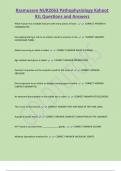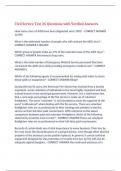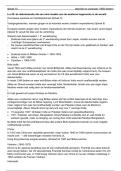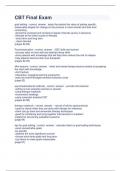Exam (elaborations)
PSYCHOLOGY AROUND US 3RD CANADIAN EDITION RONALD - Test Bank
- Module
- PSYCHOLOGY TEST BANK
- Institution
- PSYCHOLOGY TEST BANK
CHAPTER 3 NEUROSCIENCE CHAPTER LEARNING OBJECTIVES 1. Understand the key methods that scientists use to learn about brain anatomy and functioning. • Neuroscientists examine autopsy tissue and patients with localized brain damage to learn about brain anatomy and brain function. • EE...
[Show more]












